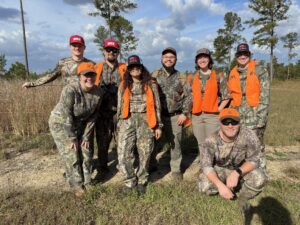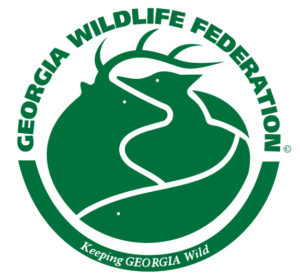 By Owen Jenkins of the GA DNR Wildlife Resources Division
By Owen Jenkins of the GA DNR Wildlife Resources Division
I was introduced to hunting in high school when my best friend, who had never successfully harvested an animal, took me out on my first hunt during deer season. Although we dedicated many hours in the woods battling all types of inclement weather, freezing temperatures, and swarms of mosquitoes, we couldn’t help but grow frustrated as we walked home empty handed again and again. I might not have realized it, but I was learning from making every mistake I made, from knocking the gun on the stand rail to forgetting to chamber a round before lining up the sights on a target causing me to hear the infamous “click” instead of “BOOM!”
Over the next few months, my drive to learn more about hunting techniques took off faster than the deer I spooked, as I spent every chance I had reading magazine articles, watching hunting videos, and sitting in the woods testing out different “tips and tricks” I learned along the way. My efforts finally led me to my first successful harvest! It wasn’t until the next season when I took my best friend back out hunting and watched him harvest his first deer that I realized how gratifying it can be to share my knowledge and experiences with others so they too can make these life-changing memories. While I have not gained the title of “Hunting Expert,” I have learned enough from my own mistakes to make the learning curve a little less steep for any newcomers I get the opportunity to share a hunt with. Recently, I was contacted by a Georgia Wildlife Federation (GWF) employee requesting help mentoring students at Georgia Southern University (GSU) through their hunt and learn program – Academics Afield. The answer was an unequivocal yes.
Academics Afield is a college learn-to-hunt program initiated and supported by GWF and the Georgia R3 Initiative (GWF, GA DNR-WRD, National Wild Turkey Federation (NWTF), Ducks Unlimited and the GA Chapter of Safari Club International). The GSU program is also sponsored by the GA Chapter of the NWTF. It is focused on removing participation barriers while providing training and opportunities to students new to target shooting and hunting. Each workshop offers lessons on game species biology, hunting strategy, firearm training, a guided hunt, animal processing and a wild game meal. This allows the new hunters to not only have a hands-on experience but also have the background knowledge of what makes hunting is so beneficial to conservation.
This fall’s hunting trip with the program was a public land deer hunt. On a warm afternoon in early November, I met a team of four mentors and five student participants at Alexander Wildlife Management Area about an hour from GSU campus. Standing in the parking lot, we did a quick recap of gun safety and shot placement, discussed the rules and regulations for the area, and ensured all the participants had everything they needed for the evening such as Thermacells, blaze orange, hunting licenses, etc. I had the privilege to mentor Ethan, a biology student at GSU. While he had always been interested in hunting, he hadn’t been able to find a good avenue to pursue it further until joining the Academics Afield Program.
As we eased through a hardwood drain, I pointed out various forms of deer sign and food sources until we came across a large white oak tree with a good vantage point down into the creek bottom. We cleared out a spot against the base of the large tree and settled in, quietly chatting about what to expect and how to handle common situations that may occur. After a short wait, Ethan spotted a pair of does slowly heading our way. The pair fed on acorns for nearly an hour before offering a clear shot. Ethan shifted to a comfortable position and lined up his shot. As my anticipation grew, I heard the safety of his firearm “click” and his slow, deep exhale just before the echoing boom. She dropped instantly; There was no need for blood trailing or searching. Ethan made sure to let me know how grateful he was for this opportunity.
Over the next couple hours, we cooked venison burgers, processed the deer, and shared stories of everyone’s hunt. Unfortunately, the other groups didn’t see any deer activity that evening but everyone went home with a new experience and basic knowledge of how to process a future harvest. I’ve now helped with three of these events and I must say that these students are respectful, engaging, and fun to be around. I would like to thank GWF and the Georgia R3 Initiative partners for allowing me to be a part of this program.
There are internships and volunteer opportunities at each participating institution. In Georgia, programs are active at Abraham Baldwin Agricultural College, Albany State University, Fort Valley State University, Georgia Southern University/Ogeechee Technical College, and the University of Georgia. If you attend one of these colleges and are interested in participating, or if you would like to volunteer or collaborate, email info@gwf.org.
The Georgia R3 Initiative is a cooperative effort between Georgia Wildlife Federation, Georgia Department of Natural Resources Wildlife Resources Division, National Wild Turkey Federation, the Georgia Chapter of Safari Club International, and Ducks Unlimited. Thank you to the National Shooting Sports Foundation and Bass Pro Shops and Cabela’s Outdoor Fund for continued support of the Academics Afield program.

Recent Comments